Why self-compassion is so important
05 Sep 2016 | Karen Liebenguth
Do you sometimes struggle to say "no", worried what others may
think of you? Do you often take someone's disappointment so
personally that it feels like they're rejecting you, that they no
longer like you? Do you then beat yourself up about the
situation?
Consider this for a moment. You're explaining to a good
friend that you've been asked to do something by someone
but you have too much on and you need to say no. No doubt your
friend would tell you not to worry and would support and understand
your decision. They'd show you kindness and understanding.
Why is it that so many of us struggle to offer the same
empathy and understanding to ourselves?
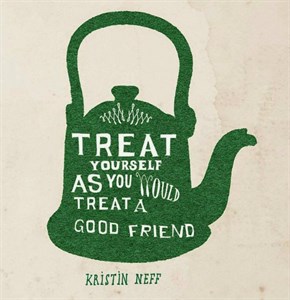
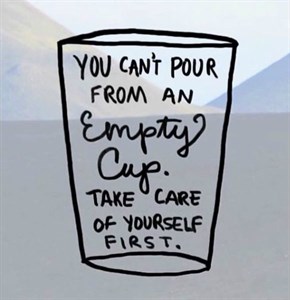
For a number of years I've followed the work of Dr. Kristin
Neff, a pioneering self-compassion researcher, author, and
teacher, so I was delighted to get the chance to hear her talk
about her work at an Action
for Happiness event in London.
What I found most interesting was how she explained the
difference between self-compassion and self-esteem, as over the
years I've worked with many clients who come saying: "I have
low-self-esteem and I want to feel more confident about myself,
about work, about life in general"
What is self-compassion?
Firstly, compassion literally means 'to suffer with'. It's our
ability to recognise when someone is in emotional pain or having a
tough time - and to then offer them warmth, kindness, a listening
ear or a helping hand. Self-compassion simply involves offering
that same friendly, warm and understanding attitude to ourselves
rather than judging or criticising ourselves harshly.
Self-esteem refers to our sense of self-worth - our perceived
value, or how much we like or don't like ourselves - and is
contingent on our current circumstances, our latest successes and
failures.
Self-compassion, by contrast, is not dependent on external
circumstances, it's always available, especially when we find
ourselves in a difficult or painful situation. What's more, we
don't have to feel as good as or better than others to feel good
about ourselves. Self-compassion allows for personal failings
to be acknowledged with kindness and understanding.
Self-compassion is not dependent on self-evaluation, comparing
ourselves to others (which can lead to self-absorption, a lack of
motivation and even depression) but instead comes from an
understanding that each person is a human being
deserving compassion and understanding, not because they are
pretty, clever, multi-talented, intelligent etc.
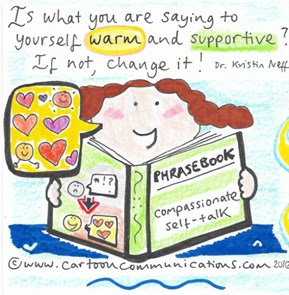
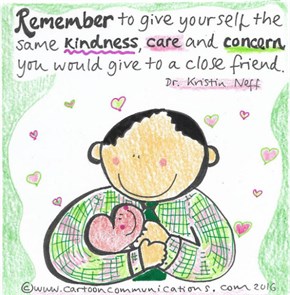
Treat yourself as you would a good
friend
By practising self-compassion we can turn the enemies
in our head into friends.
"People who are compassionate to themselves are much more likely
to be happy, resilient, optimistic and motivated to change
themselves and their lives for the better. When our inner voice
plays the role of a supportive friend (not a continual critic),
then when we notice some personal failing, we feel safe and
accepted enough to see ourselves clearly and make the changes
needed to be healthier and happier" ~ Dr. Kristin
Neff
I've been working with a client whose emotional wellbeing
depends on others' responses. I've been helping her to be more
self-compassionate, particularly in those moments when she
wants to say 'no' to something.
Rather than always needing others' understanding, she is
learning to understand herself and recognise that it is ok to say
'no' at times - and although people may be disappointed with her
saying 'no', this disappointed is theirs, and that it doesn't mean
that they don't like her anymore.
The wonderful thing is that she has become more able to bear the
discomfort of being honest with others, because she's been learning
to understand and to reassure herself.
A path to greater emotional
resilience?
Research indicates that, in comparison to self-esteem,
self-compassion is associated with greater emotional resilience,
better self-awareness and more caring relationships, as well as
less narcissism and anger.
What is also interesting is that research shows there is only a
very weak link between being compassionate to others and
self-compassion, i.e. we can be compassionate towards others
without necessarily being self-compassionate.
But importantly, the more we are able to be kind to ourselves,
the longer we can sustain compassion for others. By
practising self-compassion, we "fill up our own tank" with
goodness - with warmth, understanding, friendliness and support.
And the fuller our own tank is, the happier we are and the more we
are able to offer compassion to others over a sustained period
of time.
I'll sign off with a link to one of my favourite
self-compassion exercises, the self-compassionate break from Kristin
Neff. And if you're curious to see self-compassionate you are,
take the self-compassion questionnaire. I score 3.8 out
of 5, which means I'm moderately self-compassionate. So I have more
work to do.
I could beat myself up for not being self-compassionate enough,
but these days I am able to catch myself and not go down that
downward spiral. Instead, I can see my progress because only a few
years ago I would probably have scored much lower!
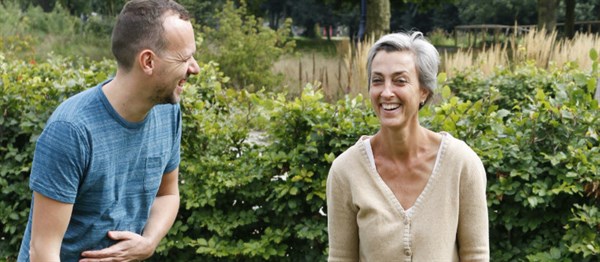
Karen Liebenguth is a qualified coach and an
accredited mindfulness teacher. She works with individuals and
organisations to foster personal development. Karen specialises in
working with clients outdoors in London's parks and green space
because she believes that's where insight, change and creativity
can happen most naturally.

For more information visit: www.greenspacecoaching.com or drop Karen a
line: karen@greenspacecoaching.com